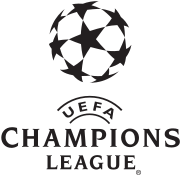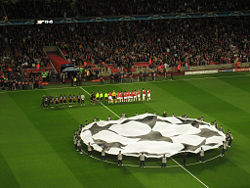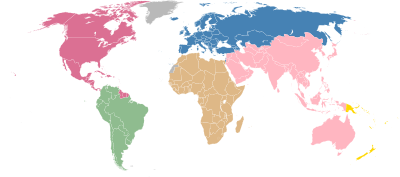UEFA Champions League
 |
|
| Founded | 1955 (1992 in its new format) |
|---|---|
| Region | Europe (UEFA) |
| Number of teams | 32 (Group stage) 76 or 77 (Total) |
| Current champions | |
| Most successful club | |
| Television broadcasters | List of broadcasters |
The UEFA Champions League, which evolved from the European Champion Clubs' Cup, is a seasonal club football competition organised by UEFA since 1992 (or overall in its older format since 1955) for the most successful football clubs in Europe. The prize, the European Champion Clubs' Cup (more commonly known as the European Cup), is the most prestigious club trophy in the sport. The UEFA Champions League is separate from the UEFA Cup.
The tournament consists of several stages. In the present format it begins in mid-July with three preliminary knockout qualifying rounds. The 16 surviving teams join 16 seeded teams in a group stage. Eight group winners and eight runners-up enter the final knockout rounds, which end with the final match in May. Previously only the champions of their respective national league could participate in the competition; however, this was changed in 1997 to allow the runners-up of the stronger leagues to compete as well.
The title has been held by 21 different clubs, 12 of which have won the title more than once. The all-time record-holder is Real Madrid with their nine wins.
Contents |
History
The tournament was inaugurated in 1955, at the suggestion of the French sports journalist and editor of L'Équipe Gabriel Hanot,[1] as a continental competition for winners of the European national football leagues, as the European Champion Clubs' Cup, abbreviated to European Cup.
The competition began as the 1955–56 using a two-leg knockout format where the teams would play two matches, one at home and one away, and the team with the highest overall score qualifying for the next round of the competition. Entry was restricted to the teams that won their national league championships, plus the current European Cup holder. This qualification system continued until 1992. In the 1992–93 season, the tournament was renamed UEFA Champions League and in 1997–98, eligibility was expanded to include not just domestic champions but also the best performing runners up according to UEFA's coefficient ranking list[2]. In UEFA's coefficient system, a team finishing second in the Spanish La Liga would be more deserving of an automatic place in the Champions League than a team finishing first in, for example, Polish Ekstraklasa. As a result, the system was restructured so that national champions from lower ranked countries had to qualify for the group stages, while runners-up from higher ranked countries would automatically get places.
Between 1960 and 2004 the winner of the tournament qualified for the now defunct Intercontinental Cup against the winner of the Copa Libertadores of South America. Since then, with FIFA taking over, the winner automatically qualifies for the FIFA Club World Cup with other winners of continental club championships.
- See also: List of European Cup and UEFA Champions League winners
Qualification
- See also: UEFA coefficients

Teams that finish 1st to 4th in the strongest leagues go to the qualifying round of the UEFA Champions League.
The number of places in the competition depends on the association's rank in the UEFA coefficients table:
- associations ranked 1 to 3 have four positions,
- associations ranked 4 to 6 have three positions,
- associations ranked 7 to 15 have two positions,
- associations ranked 16 or lower have one position.
An association's rank also determines the stage at which the clubs enter the competition. For example, the three highest-ranked associations have two places in the group stage (for champions and runners-up) and two in the third qualifying round (for third and fourth-placed teams), whereas the lowest-ranked associations have only one place in the first qualifying round for their champions. Nine highest-ranked associations have at least one automatic place in the group stage. The situation with the European Cup holders has not been clearly defined. There was controversy when Liverpool won the competition in 2004–05 but finished outside the top four in the FA Premier League. The Football Association ruled that Everton, who finished fourth in the Premier League, should get the final English place in the 2005–06 European Cup. UEFA came to an agreement that both Merseyside rivals would be allowed to enter the competition with Liverpool starting from the first qualifying round and Everton starting from the third qualifying round. UEFA's current rule is that if the European Cup winners fail to finish in one of its national league's qualifying positions, it will take the place of the lowest placed team in its league. The superseded team will go to the UEFA Cup.
In 2005-06, Liverpool and Artmedia Bratislava of Slovakia became the first teams to reach the Champions League group phase after playing in all three qualifying rounds. In 2008-2009, both BATE and Anorthosis Famagusta FC achieved the same feat.
In addition to sporting criteria, any club must be licensed by its national association to participate in the Champions league. To obtain a license, club must meet certain stadium, infrastructure and finance requirements.
FC Barcelona, Manchester United, and FC Porto are the teams that have appeared most often in the group stages: fifteen each. FC Porto and Barcelona have only won the tournament once each since the establishment of the Group stages (2004 and 2006 respectively), whilst Manchester United have won it three times, in 1968, 1999 and 2008.
The stages
The tournament consists of several stages and begins with three preliminary knockout qualifying rounds. Different teams start in different rounds, according to their position in domestic league and the UEFA coefficients of their league, while the sixteen top ranked teams spread across the biggest domestic leagues qualify directly. The current system was adopted in 2003.
Changes to the competition format from 2009-10 onwards
The main focus of the changes was to enable champions coming from associations ranked 13 to 53 much easier access to the main tournament through a separate qualifying route, rather than going head-to-head with non-champions from associations ranked 1 to 12. Five teams will enter into the group stage from each new route.
22 teams will now directly qualify for the group stage, the additional 6 teams being champions of associations ranked 10 to 12, and 3rd placed teams in associations ranked 1 to 3. It was also decided that the final would be played on the Saturday evening in calendar week 20 (19:45 BST) from 2009–10 onwards, instead of the Wednesday evening.[3]
Wembley Stadium in London was looking likely to host the event that year, only a week after the FA Cup Final would be played there. This caused some criticism and it was later announced that the 2010 final would be played at the Santiago Bernabéu Stadium in Madrid.[4]
Sponsorship

Like the FIFA World Cup, the UEFA Champions League is sponsored by a group of multinational corporations, in contrast to the single main sponsor of either the Barclays Premier League, the Copa Santander Libertadores or Serie A TIM. When the Champions League was created in 1992, it was decided that a maximum of eight companies should be allowed to sponsor the event, with each corporation being allocated four advertising boards around the perimeter of the pitch, as well as logo placement at pre- and post-match interviews and a certain number of tickets to each match. This, combined with a deal to ensure tournament sponsors were given priority on television advertisements during matches, ensured that each of the tournament's main sponsors was given maximum exposure.[5]
The tournament's current main sponsors are:
- Ford
- Heineken (excluding Norway, France and Russia, where alcohol sponsorship is restricted. In France the Heineken adboard is replaced with an adboard with the sentence: "Great Together" and in Russia the Heineken adboard is replaced by a "No To Racism" adboard)
- MasterCard
- Sony
- The PlayStation series also sponsors the tournament as one of Sony's brands
- Vodafone
Adidas is a secondary sponsor and supplies the official match ball, as they do for all other UEFA competitions (excluding the UEFA Cup).
Konami's Pro Evolution Soccer is also a secondary sponsor as the official Champions League video game.
Media coverage
The competition attracts a huge television audience, not just in Europe, but throughout the world. The matches are broadcast in over 70 countries in more than 40 languages each year, and some important matches can attract over 200 million TV audience, often considered as one of the most watched sports events on TV.[6]
Records and statistics
By club
| Team | Won | Runner Up | Years Won | Years Runner Up |
|---|---|---|---|---|
| 9 | 3 | (1956, 1957, 1958, 1959, 1960, 1966, 1998, 2000, 2002) | (1962, 1964, 1981) | |
| 7 | 4 | (1963, 1969, 1989, 1990, 1994, 2003, 2007) | (1958, 1993, 1995, 2005) | |
| 5 | 2 | (1977, 1978, 1981, 1984, 2005) | (1985, 2007) | |
| 4 | 3 | (1974, 1975, 1976, 2001) | (1982, 1987, 1999) | |
| 4 | 2 | (1971, 1972, 1973, 1995) | (1969, 1996) | |
| 3 | 0 | (1968, 1999, 2008) | - | |
| 2 | 5 | (1961, 1962) | (1963, 1965, 1968, 1988, 1990) | |
| 2 | 5 | (1985, 1996) | (1973, 1983, 1997, 1998, 2003) | |
| 2 | 3 | (1992, 2006) | (1961, 1986, 1994) | |
| 2 | 2 | (1964, 1965) | (1967, 1972) | |
| 2 | 0 | (1979, 1980) | - | |
| 2 | 0 | (1987, 2004) | - | |
| 1 | 1 | (1967) | (1970) | |
| 1 | 1 | (1983) | (1980) | |
| 1 | 1 | (1986) | (1989) | |
| 1 | 1 | (1993) | (1991) | |
| 1 | 0 | (1970) | - | |
| 1 | 0 | (1982) | - | |
| 1 | 0 | (1988) | - | |
| 1 | 0 | (1991) | - | |
| 1 | 0 | (1997) | - | |
| 0 | 2 | - | (1956, 1959) | |
| 0 | 2 | - | (2000, 2001) | |
| 0 | 1 | - | (1957) | |
| 0 | 1 | - | (1960) | |
| 0 | 1 | - | (1966) | |
| 0 | 1 | - | (1971) | |
| 0 | 1 | - | (1974) | |
| 0 | 1 | - | (1975) | |
| 0 | 1 | - | (1976) | |
| 0 | 1 | - | (1977) | |
| 0 | 1 | - | (1978) | |
| 0 | 1 | - | (1979) | |
| 0 | 1 | - | (1984) | |
| 0 | 1 | - | (1992) | |
| 0 | 1 | - | (2002) | |
| 0 | 1 | - | (2004) | |
| 0 | 1 | - | (2006) | |
| 0 | 1 | - | (2008) |
(When sorted by years won or lost, the table is sorted by the date of each team's first win)
By nation
| Nation | Wins | Runs Up | Winning Clubs | Runners-Up |
|---|---|---|---|---|
| 11 | 14 | Milan (7), Juventus (2), Internazionale (2) | Juventus (5), Milan (4), Internazionale (2), Fiorentina (1), Roma (1), Sampdoria (1) | |
| 11 | 9 | Real Madrid (9), Barcelona (2) | Real Madrid (3), Barcelona (3), Valencia (2), Atlético Madrid (1) | |
| 11 | 5 | Liverpool (5), Manchester United (3), Nottingham Forest (2), Aston Villa (1) | Liverpool (2), Leeds United (1), Arsenal (1), Chelsea (1) | |
| 6 | 7 | Bayern Munich (4), Borussia Dortmund (1), Hamburg (1) | Bayern Munich (3), Bayer Leverkusen (1), Borussia Mönchengladbach (1), Eintracht Frankfurt (1), Hamburg (1) | |
| 6 | 2 | Ajax (4), PSV (1), Feyenoord (1) | Ajax (2) | |
| 4 | 5 | Benfica (2), Porto (2) | Benfica (5) | |
| 1 | 5 | Marseille (1) | Stade Reims (2), Saint-Étienne (1), Marseille (1), Monaco (1), | |
| 1 | 1 | Steaua (1) | Steaua (1) | |
| 1 | 1 | Red Star Belgrade (1) | FK Partizan (1) | |
| 1 | 1 | Celtic (1) | Celtic (1) | |
| 0 | 1 | Malmö FF (1) | ||
| 0 | 1 | Panathinaikos (1) | ||
| 0 | 1 | Club Brugge (1) |
All-time top goalscorers
Including qualifying games
Players in Bold are still active.
| Rank | Nation | Player | Goals | Games | Goals/Games | Debut in Europe | Clubs |
|---|---|---|---|---|---|---|---|
| 1 | Raúl González | 64[7] | 122 | 0.54 | 1995 | Real Madrid | |
| 2 | Ruud van Nistelrooy | 60 | 79 | 0.76 | 1997 | PSV Eindhoven, Manchester United, Real Madrid | |
| 3 | Andriy Shevchenko | 56 | 103 | 0.54 | 1994 | Dynamo Kyiv, Milan, Chelsea | |
| 4 | Alfredo di Stéfano | 49 | 58 | 0.84 | 1955 | Real Madrid | |
| 5 | Eusébio | 47 | 64 | 0.73 | 1961 | Benfica | |
| 6 | Filippo Inzaghi | 46 | 75 | 0.61 | 1997 | Juventus, Milan | |
| 7 | Thierry Henry | 46 | 100 | 0.46 | 1997 | Monaco, Arsenal, Barcelona | |
| 8 | Alessandro Del Piero | 42 | 83 | 0.51 | 1993 | Juventus |
All-time top appearances
| Rank | Nation | Player | Games | Club |
|---|---|---|---|---|
| 1 | Raúl González | 122 | Real Madrid | |
| 2 | Roberto Carlos | 120 | Real Madrid, Fenerbahçe | |
| 3 | Thierry Henry | 115 | Monaco, Arsenal, Barcelona | |
| 4 | Paolo Maldini | 107 | Milan | |
| 5 | Ryan Giggs | 104 | Manchester United |
References
- ↑ Matthew Spiro (12 May 2006). "Hats off to Hanot" (in English). UEFA.com. Retrieved on 10 July 2006.
- ↑ uefa.com - UEFA Champions League
- ↑ "Champions League changes agreed", UEFA (1 December 2007). Retrieved on 1 December 2007.
- ↑ "Madrid and Hamburg awarded 2010 finals", UEFA (28 March 2008). Retrieved on 28 March 2008.
- ↑ Thompson, Craig; Magnus, Ems (February 2003). "[http://www.ekospor.com/Sports-Marketing/Sport%20Marketing%20uefa.pdf The Uefa Champions League Marketing]". Fiba Assist Magazine: pp.49–50. http://www.ekospor.com/Sports-Marketing/Sport%20Marketing%20uefa.pdf. Retrieved on 19 May 2008.
- ↑ "World’s most watched TV sports events: 2006 Rank & Trends report", Initiative (19 January 2007). Retrieved on 26 May 2007.
- ↑ Leach, Matthew (2008-11-25). "Raul tops European goal scoring charts and guides Real Madrid into the last 16". The Daily Telegraph. Retrieved on 2008-12-13.
External links
- UEFA Official Site
- "50 years of the European Cup" (PDF). UEFA (October 2004). Retrieved on 17 July 2008.
- RSSSF European Cups Archive
- European Cup History
- All time statistics with link to all results
|
European Cup Seasons
|
|||||||||||||
|---|---|---|---|---|---|---|---|---|---|---|---|---|---|
|
|||||||||||||
|
UEFA Champions League seasons
|
|||||||||||||
|
|||||||||||||
|
European Cup and UEFA Champions League Finals
|
|||||||||||||
|
|||||||||||||
|
International club football
|
|||||||||||||
|
|||||||||||||
|
|||||||||||||
